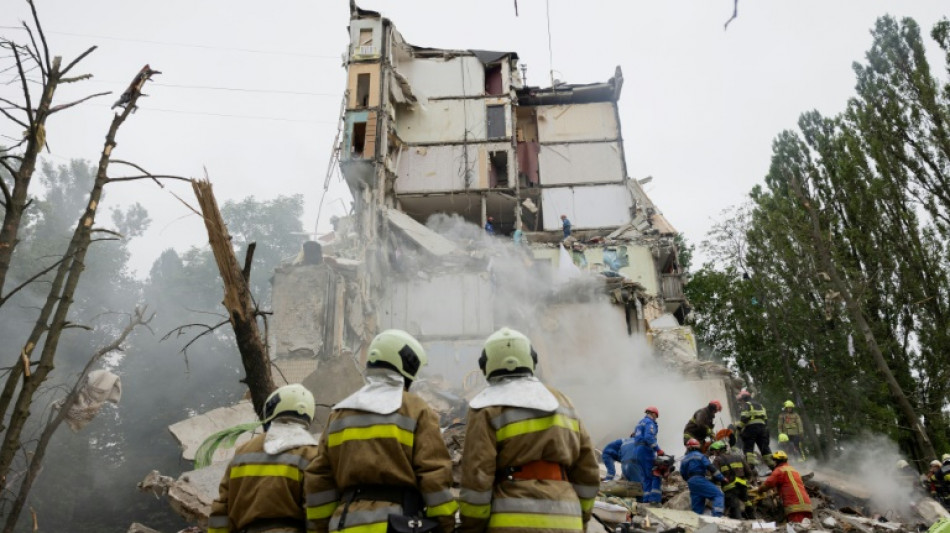
RBGPF
-0.0500


Ukrainian President Volodymyr Zelensky on Thursday urged his allies to bring about "regime change" in Russia, hours after a Russian drone and missile attack on Kyiv killed 16 people including a six-year-old boy.
The overnight strikes reduced part of a nine-storey apartment block in Kyiv's western suburbs to rubble and wounded at least 150 people in the capital, authorities said.
The Russian army meanwhile claimed to have captured Chasiv Yar, a strategically important hillside town in eastern Ukraine where the two sides have been fiercely fighting for months.
Moscow has stepped up its deadly aerial assaults on Ukraine in recent months, resisting US pressure to end its nearly three-and-a-half-year invasion as its forces grind forward on the battlefield.
Speaking virtually to a conference marking 50 years since the signing of the Cold War-era Helsinki Accords, Zelensky said he believed Russia could be "pushed" to stop the war.
"But if the world doesn't aim to change the regime in Russia, that means even after the war ends, Moscow will still try to destabilise neighbouring countries," he said.
From late Wednesday to early Thursday, Russia fired over 300 drones and eight cruise missiles at Ukraine, with Kyiv the main target, the Ukrainian air force said.
One missile tore through a nine-storey residential building in the west of the capital, tearing off its facade, authorities said.
AFP journalists at the scene saw rescuers scouring through a smouldering mound of broken concrete, the belongings of residents scattered among the debris.
"It's a shock. I still can't get my bearings. It's very frightening," Valentyna Chestopal, a 28-year-old resident of Kyiv, told AFP.
Among the victims was a six-year-old boy who died on the way to hospital, the head of the city's military administration, Tymur Tkachenko, posted on Telegram.
Zelensky said late Thursday that over 150 people had been injured, "including 16 children and six policemen," denouncing an "unimaginable scale of terror and brutality" from the Russian strikes.
Kyiv's mayor, Vitali Klitschko, said Friday had been declared a day of mourning in the capital for the victims.
The Russian army said it had hit a military airfield, ammunition warehouse and drone production facilities with a combined overnight strike using weaponry and drones.
The attack came just days after US President Donald Trump issued a 10-day ultimatum for Moscow to halt its invasion, now in its fourth year, or face sanctions.
- Key capture in east -
Russia said Thursday that it had captured the town of Chasiv Yar, a strategically important military hub for Ukrainian forces in the eastern Donetsk region.
The town "was liberated by Russian forces", Russia's defence ministry said, though a Ukrainian army spokesperson rejected Russia's claim as "lies".
Zelensky said Moscow's claim was "Russian disinformation", adding that "Ukrainian units are defending our positions."
Ukrainian military analyst Oleksandr Kovalenko said Russian forces "have full control over the entire northern and eastern part," of Chasiv Yar, including districts that had been hardest to get.
But he said fighting for the western side was ongoing, with the situation "very difficult".
Taking control of Chasiv Yar would be a major military gain for Russia, which has been making incremental but steady territorial gains for months.
Home to around 12,000 people before the war but now largely destroyed, the town could allow Russian forces to advance on remaining civilian strongholds in the eastern Donetsk region.
These include the garrison cities of Kramatorsk and Sloviansk, important logistical bases for the Ukrainian military and home to many civilians who have not fled the fighting.
The Kremlin has made the capture of the Donetsk region a priority since it claimed the industrial region as part of Russia in September 2022.
Russia, which denies targeting civilians, had not yet commented on the strike or Zelensky's call for regime change.
- Anti-corruption bill overturned -
Thursday's attacks came just hours before Ukrainian lawmakers overturned a highly criticised law, signed by Zelensky last week, that would have curbed the powers of two anti-graft bodies.
Zelensky reversed course after the legislation sparked the biggest public unrest in Ukraine since Russia's invasion began in February 2022.
The original law had put the National Anti-Corruption Bureau of Ukraine (NABU) and Specialised Anti-Corruption Prosecutor's Office (SAPO) under the direct authority of the prosecutor general, who is appointed by the president.
Critics took to the streets in protests, fearing the the move would facilitate presidential interference in corruption probes.
The European Union said the bill could derail anti-corruption reforms that are key for joining the bloc.
X.So--ThChM